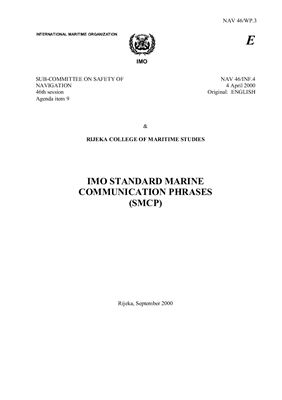103 c.
Adopted by the 22nd Assembly in November 2001 as resolution A.918(22) IMO Standard Marine Communication Phrases. The resolution adopts the Standard Marine Communication Phrases (SMCP) and recommends a wide circulation to all prospective users and all maritime education authorities. The IMO SMCP replace the Standard Marine Navigational Vocabulary (SMNV) adopted by IMO in 1977 (and amended in 1985). The SMNV was developed for use by seafarers, following agreement that a common language - namely English - should be established for navigational purposes where language difficulties arise and the IMO SMCP has been developed as a more comprehensive standardized safety language, taking into account changing conditions in mode seafaring and covering all major safety-related verbal communication. The IMO SMCP includes phrases which have been developed to cover the most important safety-related fields of verbal shore-to-ship (and vice-versa), ship-to-ship and on-board communications. The aim is to get round the problem of language barriers at sea and avoid misunderstandings which can cause accidents.
The IMO SMCP builds on a basic knowledge of English and has been drafted in a simplified version of maritime English. It includes phrases for use in routine situations such as berthing as well as standard phrases and responses for use in emergency situations. Under the Inteational Convention on Standards of Training, Certification and Watchkeeping for Seafarers (STCW), 1978, as amended, the ability to understand and use the SMCP is required for the certification of officers in charge of a navigational watch on ships of 500 gross tonnage or above.
Adopted by the 22nd Assembly in November 2001 as resolution A.918(22) IMO Standard Marine Communication Phrases. The resolution adopts the Standard Marine Communication Phrases (SMCP) and recommends a wide circulation to all prospective users and all maritime education authorities. The IMO SMCP replace the Standard Marine Navigational Vocabulary (SMNV) adopted by IMO in 1977 (and amended in 1985). The SMNV was developed for use by seafarers, following agreement that a common language - namely English - should be established for navigational purposes where language difficulties arise and the IMO SMCP has been developed as a more comprehensive standardized safety language, taking into account changing conditions in mode seafaring and covering all major safety-related verbal communication. The IMO SMCP includes phrases which have been developed to cover the most important safety-related fields of verbal shore-to-ship (and vice-versa), ship-to-ship and on-board communications. The aim is to get round the problem of language barriers at sea and avoid misunderstandings which can cause accidents.
The IMO SMCP builds on a basic knowledge of English and has been drafted in a simplified version of maritime English. It includes phrases for use in routine situations such as berthing as well as standard phrases and responses for use in emergency situations. Under the Inteational Convention on Standards of Training, Certification and Watchkeeping for Seafarers (STCW), 1978, as amended, the ability to understand and use the SMCP is required for the certification of officers in charge of a navigational watch on ships of 500 gross tonnage or above.

